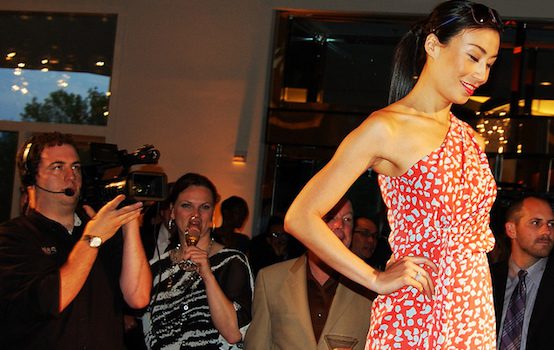Tysons Corner, the Bubble Inside the Beltway Bubble

Last week my parents came to visit, and we had lunch in Tysons Corner, Virginia, located right along the infamous Washington Beltway.
We passed the new Adaire luxury tower, which cast a shadow over the dual Bentley/Aston Martin dealership, with a Tesla store in the background and a Porsche dealer across the street. It is all, directly or indirectly, financed by the American taxpayer. We ate at a restaurant in the ground floor of a modest office building, but had to trek up and down a six-story parking garage to the “customer parking,” even though the entire garage was empty—reserved, perhaps, for the bigwigs who never show up to work. We needed a few things at Wal-Mart (surprisingly, there is one here), and I had to explain that the parking lot in front of Wal-Mart is not actually for Wal-Mart, and that, if you are coming from your car, the store has to be entered from the top level of yet another parking garage.
“If Kim Jong-Un is going to drop a nuclear bomb,” my dad remarked, “it should be on Tysons Corner.”
Tysons is an easy target for anger, with its combination of ostentatious wealth and its utter lack of coherent planning or design. It is the very archetype of ugly American sprawl: neither truly suburban, in which a leisurely drive or stroll down a sidewalk is at least in theory possible, nor truly urban, with all of the cheek-by-jowl rough-and-tumble life and character of a city. Tysons Corner instead consists of miles of grim concrete big-box stores, parking garages, flashy towers, garish office blocks, and decaying mid-century kitsch, all lining an expanse of 10-lane expressways that will kill you instantly if you crane your neck toward the dismal view for more than a second. It is the visual equivalent of putting a Beethoven symphony and a Metallica concert in a blender and piecing them back together at random.
But what should draw more attention is the fact that the greater Washington area now boasts one of the highest concentrations of wealth anywhere in the United States, much thanks to the ginormous federal bureaucracy and National Security State which has grown exponentially since the 9/11 attacks. As of 2015, fully half of the top 10 highest-income counties in the nation are in Maryland and Virginia, within an hour of the capital. There are probably as many Teslas in Fairfax County as there are in Silicon Valley.
None of this, of course, negates the reality that there is plenty of poverty, some of it desperate, right in the shadow of the U.S. Capitol. For example, there are the inner-ring suburbs of southern Maryland, largely decaying time-capsules of the 1950s which might be largely abandoned if not for people left behind by the 2008 financial crisis, low-wage workers who likely spend their days servicing their wealthy neighbors, and a deluge of poor immigrants, not all of them legal. These pockets of poverty only make the bloat and waste of the government—and its symbiosis with the sprawling, ever-increasing network of contractors, consultants, lawyers, and establishment media organs—more shameful. It is not as if these counties are rich through a roll of the dice: it is rather through what James Howard Kunstler calls “asset-stripping”—the matrix of financialization, offshoring, and an ever-increasing “Deep State” bureaucracy.
If the government should ever shrink, if the financial system should ever truly collapse, or if the military industrial complex stopped turning, this whole region would be depopulated. The “Alexandria” of The Walking Dead might prove prophetic. Without the steady flow of federal dollars, the 10-lane superhighways, luxury apartment towers, those kitschy mid-century diners, not to mention most of Loudoun and Clarke counties, would make Detroit look like a boomtown.
Much has been written about the problem of economic inequality, and whether it really is a problem. Conservatives are correct that simply being rich does not, in and of itself, hurt the poor. But does anyone think it’s helpful for a nation’s ruling class to live in such an ostentatious bubble? These are not just “the rich,” with their inherited fortunes and leisurely yacht cruises. Many of these wealthy Beltway earners have jobs that in theory are connected to the public interest, but which in practice approach a self-perpetuating racket. It is imperative that they understand the country and the people they serve, and that requires some element of economic equality. Just as important is a willingness to explore the country’s great geographical and social diversity.
For example, how many of the Tysons crowd know that the scars left by the financial collapse are still quite visible? I drove through Maryland’s Eastern Shore last year, where I came across an old convenience shop on the side of the road, well-kept but utterly abandoned. A man who lived next door told me that it had been a family-owned business since the ’50s, but had closed amid the crisis. There will likely never be a business on that site again. There may not even be money for demolition. And if it ever is demolished, it certainly won’t be replaced with a Bentley dealership.
Or how many of our elite know that Wal-Mart is now in aggressive competition with dollar stores, which are proliferating like vermin in the shells of buildings which once housed neighborhood groceries, drug stores, and five-and-dimes? How many understand what that means, how it impacts the texture of everyday life for ordinary Americans? Standing in line at Dollar Tree is not the same as being waited on at the Tysons Corner Center Bloomingdale’s.
Charles Murray and many others have written about the new upper class or elite, and its detachment from or even contempt for fellow citizens outside of the cosmopolitan metropolises. More attention, however, must be paid to the fact that our elected leaders and public servants no longer know those they profess to lead and serve.